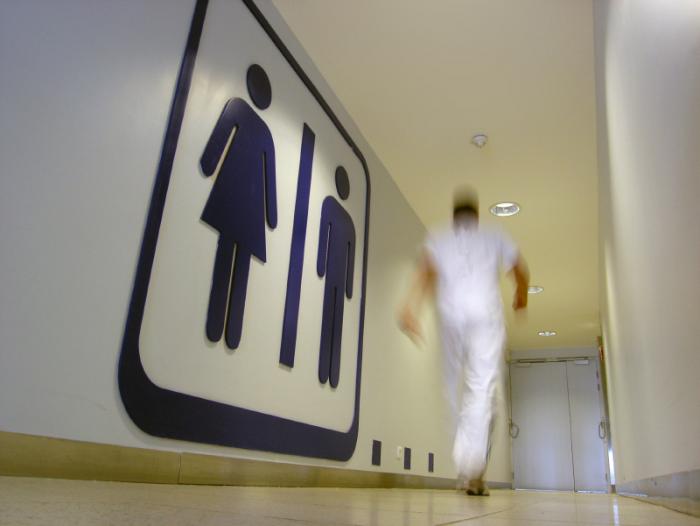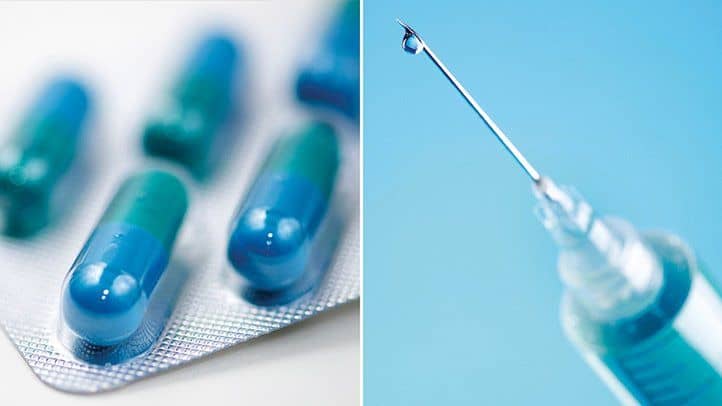Oxybutynin and tolterodine are commonly prescribed medications to stop bladder leakage. These drugs help relax bladder muscles and reduce urinary frequency.
Bladder leakage, also known as urinary incontinence, affects millions of people worldwide. This condition can be embarrassing and significantly impact the quality of life. Effective treatments are available, including medications like oxybutynin and tolterodine. These medicines work by targeting the muscles of the bladder, helping to control sudden urges and leaks.
Consulting a healthcare provider is essential for proper diagnosis and treatment. Lifestyle changes and pelvic floor exercises can also complement medication therapy. Understanding the options available can help manage symptoms and improve daily living. Always seek professional advice before starting any medication.

Credit: www.hopkinsmedicine.org
Introduction To Bladder Leakage
Bladder leakage is a common problem. It affects millions of people. It can be embarrassing and uncomfortable. This issue is also known as urinary incontinence. Understanding bladder leakage can help you find a solution. Let’s dive deeper into this topic.
The Impact Of Bladder Issues
Bladder issues affect daily life. You may feel embarrassed. It can lower your self-esteem. You might avoid social events. It can also affect your sleep. Many people experience anxiety due to bladder problems. Understanding the impact can help you seek help.
Bladder problems can cause:
- Frequent trips to the bathroom
- Disrupted sleep
- Embarrassing accidents
- Avoidance of social activities
Types Of Urinary Incontinence
There are different types of urinary incontinence. Each type has its own causes and treatments. Knowing the type you have can help you find the right treatment.
| Type | Description |
|---|---|
| Stress Incontinence | Leakage when you cough, sneeze, or laugh |
| Urge Incontinence | Sudden urge to urinate and cannot hold it |
| Overflow Incontinence | Bladder doesn’t empty completely, causing leakage |
| Functional Incontinence | Cannot reach the bathroom in time |
Stress Incontinence happens during physical activities. This includes coughing, sneezing, or lifting heavy objects. Weak pelvic muscles are often the cause.
Urge Incontinence is a sudden and strong urge to urinate. You may not make it to the bathroom in time. It is often linked to an overactive bladder.
Overflow Incontinence occurs when the bladder doesn’t empty fully. Small amounts of urine leak out.
Functional Incontinence happens when you can’t reach the bathroom in time. This could be due to mobility issues or confusion.
Understanding these types can help you choose the right treatment.

Credit: www.medicalnewstoday.com
Identifying The Causes Of Bladder Leakage
Understanding the causes of bladder leakage can help manage and treat it. Bladder leakage, also known as urinary incontinence, affects many people. Identifying the root causes is the first step in finding effective treatments.
Lifestyle Factors And Bladder Health
Certain lifestyle factors can impact bladder health. These factors include diet, hydration, and physical activity.
- Diet: Spicy foods and caffeine can irritate the bladder.
- Hydration: Not drinking enough water can concentrate urine, irritating the bladder.
- Physical Activity: Lack of exercise can weaken pelvic muscles, leading to leakage.
Monitoring these lifestyle factors can improve bladder health.
Medical Conditions Leading To Incontinence
Various medical conditions can cause bladder leakage. These conditions often affect the bladder’s ability to store or release urine properly.
| Condition | Impact on Bladder |
|---|---|
| Diabetes | Nerve damage affects bladder control. |
| Neurological Disorders | Conditions like MS affect bladder signals. |
| Pregnancy | Increased pressure on the bladder causes leakage. |
Recognizing these medical conditions can help in treating bladder leakage effectively.
Assessment And Diagnosis
Bladder leakage, also known as urinary incontinence, affects many people. To tackle this issue effectively, a comprehensive assessment and diagnosis are crucial. This involves consulting healthcare professionals and undergoing specific diagnostic tests.
Consulting Healthcare Professionals
To start, schedule an appointment with a healthcare professional. They will ask about your symptoms, medical history, and lifestyle. This initial consultation is vital for understanding the nature of your bladder leakage.
- Describe your symptoms clearly.
- Share your medical history.
- Discuss your daily habits and lifestyle.
The healthcare professional may also perform a physical examination. This helps identify any physical causes of urinary incontinence.
Diagnostic Tests For Urinary Incontinence
Several diagnostic tests can help pinpoint the cause of bladder leakage. These tests include:
- Urinalysis: Checks for infections or blood in the urine.
- Bladder Diary: Records your fluid intake, urination times, and leakage episodes.
- Postvoid Residual Measurement: Measures the amount of urine left in the bladder after urination.
- Urodynamic Testing: Assesses bladder function and pressure.
Your doctor may recommend one or more of these tests based on your symptoms and physical exam results.
| Test | Purpose | Procedure |
|---|---|---|
| Urinalysis | Check for infections | Sample of urine tested |
| Bladder Diary | Track urination patterns | Daily record kept |
| Postvoid Residual Measurement | Measure urine left in bladder | Ultrasound or catheter used |
| Urodynamic Testing | Assess bladder function | Various tests performed |
Accurate assessment and diagnosis are essential for effective treatment. Understanding your specific condition helps in choosing the right medicine to stop bladder leakage.
Medications For Urinary Incontinence
Urinary incontinence affects millions, causing unwanted bladder leakage. Fortunately, there are various medications to help manage this condition. These medications work by targeting different aspects of bladder control, offering relief and improving the quality of life.
Anticholinergics And Their Role
Anticholinergics are commonly prescribed for urinary incontinence. They work by blocking specific receptors in the bladder, reducing unwanted contractions. This helps the bladder hold more urine and reduces the urgency to urinate.
| Medication | Brand Name |
|---|---|
| Oxybutynin | Ditropan |
| Solifenacin | VESIcare |
| Darifenacin | Enablex |
- Reduces bladder contractions
- Increases bladder capacity
- Lessens the urge to urinate
Mirabegron: A Beta-3 Agonist
Mirabegron is another medication used for urinary incontinence. It belongs to a class of drugs known as Beta-3 agonists. Mirabegron works by relaxing the bladder muscle, allowing it to store more urine without frequent urges.
This medication is especially useful for those who cannot tolerate anticholinergics. It has fewer side effects related to dry mouth and constipation.
- Relaxes bladder muscle
- Increases urine storage
- Fewer side effects
Topical Estrogens For Post-menopausal Women
For post-menopausal women, topical estrogens can be beneficial. Estrogen levels drop after menopause, affecting bladder control. Topical estrogens can help strengthen the tissues around the urethra and bladder.
These medications come in various forms, such as creams, rings, and tablets. They help reduce symptoms of urinary incontinence by improving the health of vaginal and urethral tissues.
- Strengthens bladder and urethral tissues
- Reduces symptoms of incontinence
- Improves overall bladder health
Lifestyle Modifications And Behavioral Interventions
Bladder leakage is a common issue. Lifestyle modifications and behavioral interventions can help manage it. These strategies can reduce symptoms and improve quality of life.
Dietary Changes To Reduce Bladder Leakage
Diet plays a key role in bladder health. Certain foods and drinks can irritate the bladder. Avoiding them can reduce leakage.
- Caffeine: Found in coffee, tea, and some sodas. It can increase urine production.
- Alcohol: Can irritate the bladder and increase the urge to go.
- Spicy Foods: Can cause bladder irritation for some people.
- Citrus Fruits: Oranges, lemons, and limes can irritate the bladder.
Drink plenty of water. Staying hydrated helps keep the bladder healthy. Aim for at least eight glasses a day.
Pelvic Floor Exercises And Bladder Training
Strengthening the pelvic floor muscles can reduce leakage. These muscles support the bladder and help control urination.
Perform Kegel exercises daily. Follow these steps:
- Sit comfortably and tighten your pelvic floor muscles.
- Hold the contraction for five seconds.
- Relax for five seconds.
- Repeat 10 times. Do this three times a day.
Bladder training can also help. This technique teaches your bladder to hold urine longer.
Follow these steps for bladder training:
- Keep a diary of your bathroom trips.
- Try to delay urination by a few minutes each time.
- Gradually increase the time between trips.
Both methods can improve bladder control. Practice them regularly for best results.
Surgical Treatments And Interventions
Bladder leakage can be a challenging condition. For some, surgery might be the best solution. Surgical treatments offer long-term relief. This section explores when surgery becomes an option and the types available.
When Surgery Becomes An Option
Surgery is usually considered after other treatments fail. Doctors recommend surgery for severe incontinence. This is when non-surgical methods do not work. Surgery aims to improve quality of life.
| Condition | When Surgery is Recommended |
|---|---|
| Stress Incontinence | When pelvic exercises and medications fail |
| Urge Incontinence | When bladder training and medications do not help |
| Mixed Incontinence | When a combination of treatments is ineffective |
Types Of Surgeries For Incontinence
Different surgeries address different types of incontinence. Each type aims to support or repair the bladder.
- Sling Procedures: A sling is placed under the urethra. It supports the bladder neck.
- Bladder Neck Suspension: This surgery lifts the bladder neck. It provides better support.
- Artificial Urinary Sphincter: A device is implanted. It controls the release of urine.
Choosing the right surgery depends on various factors. These include the type of incontinence and the patient’s health.
Alternative Therapies And Supplements
Exploring alternative therapies and supplements for bladder leakage can offer new hope. Many people prefer natural methods over conventional medicine. Below are some popular options.
Herbal Remedies And Their Efficacy
Herbal remedies have been used for centuries to treat various conditions. They are often seen as a natural and safe alternative to pharmaceuticals.
- Saw Palmetto: Known for its anti-inflammatory properties.
- Gosha-jinki-gan: A traditional Japanese remedy for bladder issues.
- Horsetail: Used for its diuretic effects.
A study showed that Saw Palmetto helps reduce urinary urgency. Another research indicated that Gosha-jinki-gan could improve bladder function.
Acupuncture And Bladder Control
Acupuncture is an ancient Chinese therapy. It involves inserting thin needles into specific points on the body.
| Benefits | Details |
|---|---|
| Improved Bladder Control | Stimulates nerves that regulate the bladder. |
| Reduced Urgency | Balances the body’s energy flow. |
Many studies support acupuncture for bladder control. Patients often report less urgency and better control.
:max_bytes(150000):strip_icc()/overactive-bladder-treatment-5116161-FINAL-9865898b12f74debac3e467c5b76c01d.jpg)
Credit: www.verywellhealth.com
Navigating Emotional And Social Impacts
Bladder leakage can be a challenging condition. It affects not only the body but also the mind. The emotional and social impacts can be overwhelming. Many individuals feel embarrassed or anxious. It’s important to address these feelings. Here, we explore ways to cope and find support.
Coping Strategies For Psychological Stress
Bladder leakage can cause significant psychological stress. Implementing coping strategies can help. Here are some effective methods:
- Mindfulness Meditation: Practice deep breathing and focus on the present.
- Physical Activity: Exercise can reduce stress and improve mood.
- Journaling: Write down your thoughts and feelings to understand them better.
- Professional Help: Seek therapy or counseling if needed.
These strategies can help manage stress. They can also improve overall well-being.
Building Support Networks
Building a support network is crucial. Having a support system can make a big difference. Here are ways to create one:
- Join Support Groups: Find groups online or in your community.
- Talk to Family and Friends: Share your feelings with trusted individuals.
- Online Communities: Participate in forums and social media groups.
- Professional Support: Connect with healthcare providers for guidance.
A strong support network provides emotional relief. It helps individuals feel understood and less isolated.
| Method | Benefits |
|---|---|
| Mindfulness Meditation | Reduces stress and improves focus |
| Physical Activity | Boosts mood and overall health |
| Journaling | Helps process emotions |
| Professional Help | Offers expert guidance |
Dealing with bladder leakage is tough. But with these strategies, you can navigate the emotional and social impacts effectively.
Preventive Measures And Early Detection
Bladder leakage is a common issue. Preventive measures and early detection can help manage it better. Knowing the risks and staying informed is crucial. This section will highlight key strategies for prevention and early diagnosis.
Screening For Potential Risks
Regular screenings can identify early signs of bladder leakage. Doctors check for symptoms and risk factors. These include age, medical history, and lifestyle habits.
| Risk Factor | Importance |
|---|---|
| Age | Older adults are more at risk |
| Medical History | Previous urinary issues increase risk |
| Lifestyle Habits | Smoking and poor diet can contribute |
Educational Resources And Awareness
Access to educational resources is vital. Patients should be aware of bladder health. Information about bladder-friendly diets and exercises can be helpful.
- Bladder-friendly foods include cranberries and water-rich vegetables.
- Pelvic floor exercises strengthen bladder control.
Awareness campaigns can spread knowledge. Community workshops and online resources are effective. These programs teach preventive measures and signs to watch for.
Future Perspectives In Incontinence Treatment
The world of incontinence treatment is evolving rapidly. New advancements bring hope for those affected by bladder leakage. Exciting developments are taking place in medical research and technology.
Innovations In Medical Research
Medical research is making strides in understanding bladder leakage. Scientists are exploring the root causes of incontinence. They are developing targeted treatments to address these causes.
Innovations include:
- Gene therapy
- Stem cell research
- Biomechanical studies
Gene therapy offers potential cures by correcting genetic issues. Stem cell research aims to regenerate damaged tissues. Biomechanical studies improve the design of supportive devices.
Emerging Medications And Technologies
New medications and technologies are emerging to treat incontinence. These innovations promise better management of bladder leakage. They are designed to improve the quality of life for patients.
Some promising developments include:
| Medication/Technology | Benefits |
|---|---|
| Botulinum toxin injections | Reduce bladder muscle spasms |
| Neuromodulation devices | Stimulate nerves controlling the bladder |
| New drug formulations | Improve bladder control |
Botulinum toxin injections help relax overactive bladder muscles. Neuromodulation devices use electrical impulses to control bladder function. New drug formulations offer better efficacy with fewer side effects.
Frequently Asked Questions
What Causes Bladder Leakage?
Bladder leakage occurs due to weakened pelvic muscles or nerve damage. Age, childbirth, and certain medical conditions can contribute. Medications can help manage symptoms.
How Does Medicine Stop Bladder Leakage?
Medicines for bladder leakage strengthen bladder muscles or calm overactive nerves. They help control urine flow and reduce leakage incidents. Consult your doctor for the best option.
Are Bladder Leakage Medications Safe?
Bladder leakage medications are generally safe when prescribed by a doctor. They may have side effects like dry mouth or constipation. Always follow your doctor’s advice.
Can Lifestyle Changes Help With Bladder Leakage?
Yes, lifestyle changes like pelvic floor exercises, weight management, and dietary adjustments can improve bladder control. Combine these with medication for better results.
Conclusion
Finding the right medicine can significantly improve your quality of life. Effective treatments are available for bladder leakage. Consult your healthcare provider for personalized advice. Take control of your health and regain confidence. Say goodbye to the discomfort and embarrassment.
Start your journey to a leak-free life today.


